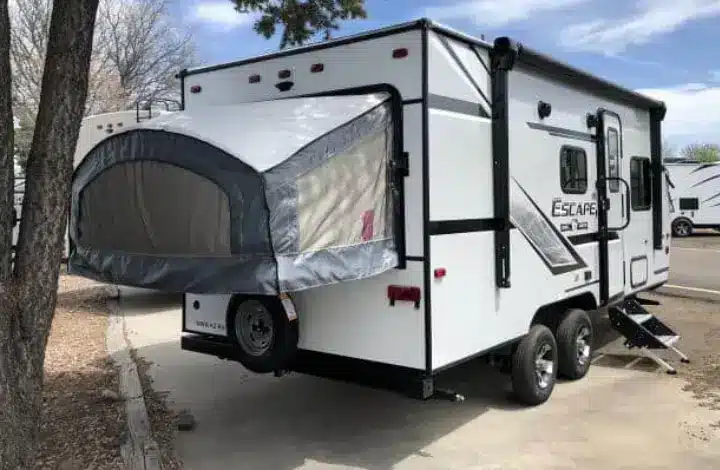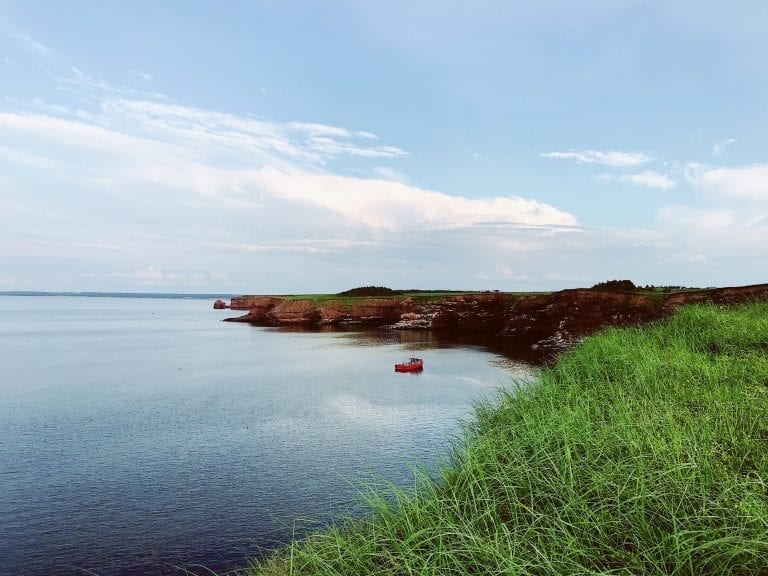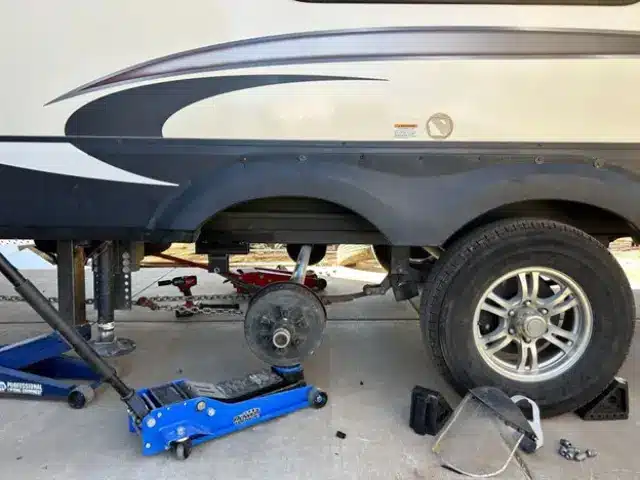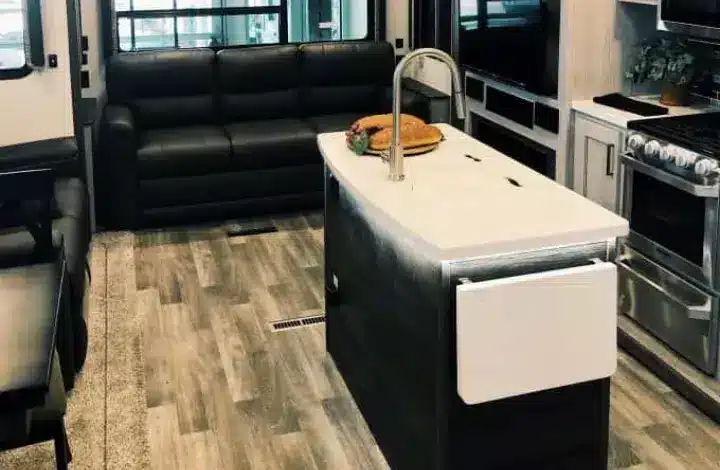7 Essential Questions to Ask When Buying a Used RV
Buying a used RV is the financially responsible choice—or is it? If you’re like most RVers, you’ve probably debated this question with friends or your spouse at one time or another.
Speaking as someone who’s bought both new and used, I can say that based on my own experience, the answer is ultimately: Yes . . . If you’re smart about it.
I bought my first trailer brand new, which nearly everyone will tell you is a bad idea, but I loved it. I figured that if anything broke in my first year on the road, it would be covered under warranty. But that was only partly true. The few things that had broken on the factory floor took months of sitting on a dealer’s lot to fix. And when they finally got to my repair, they broke more than they fixed.
When it came time for more space, I bought my fifth wheel used. At almost five years old, it’s had its fair share of issues—with no warranty to back me up. Some were small, some were large and expensive, and some were totally avoidable. If only I’d asked the right questions when I bought it.
That, dear reader, is what this article is all about: helping you ask the right questions when you purchase your new-to-you RV. Before you approach any used RV purchase, it’s critical to go into it with all the information, no matter how great the deal may be.
Know What You’re Looking For
Stop here and do not pass go until you’re sure about your requirements. What are you hoping to do with your RV? Where do you want to go? How do you like to travel?
While we’d all love an RV that can go anywhere like a van but feels spacious like a fifth wheel, there’s no such thing as the perfect RV. Any rig will require compromise, so make a list of your must-haves before shopping.
What Features are Important for You
What’s more important to you: quality or price? Size or flexibility? Do you have any mechanical skills that might make an older RV a fun project, or will a breakdown on the road be financially devastating? Answer these questions honestly.
Answering these questions will help you determine the size and type of RV that will fit your budget. For instance, I wouldn’t recommend a 10-year-old Class C to someone with no DIY repair skills and no emergency repair budget. (Actually, if you don’t have an emergency repair budget, you shouldn’t own an RV of any kind. Not even a new RV.)
There are no hard and fast rules, but in general, these are the pros and cons of RVs:
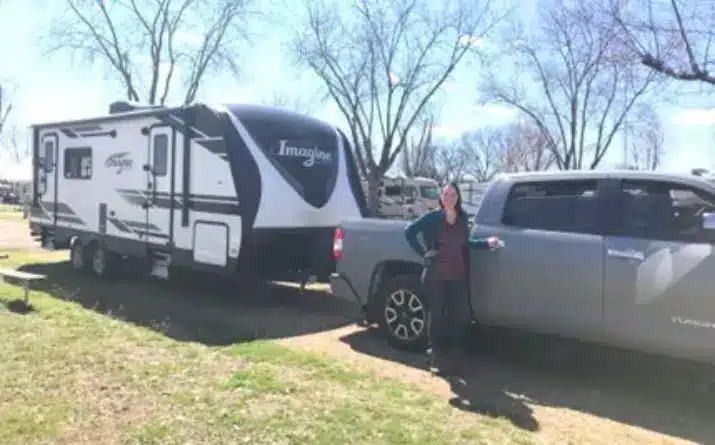
Must-Haves or Nice-to-Haves
Also, decide on any must-have features. When my parents bought their used fifth wheel, they were convinced they needed a washer and dryer. A year later, they sold that unit because they never used it.
Think carefully about what’s a must-have versus a nice-to-have for you.
Top 7 Questions to Ask When Buying a Used RV
Here are the top 7 essential questions you should ask before buying a used RV.
#1: Can I Have the RV Inspected by a Professional?
This might just be the most important question you can ask. I decided to skip an inspection when I bought my RV because I knew what I was looking at—or so I thought—and I didn’t want to spend the extra $500 or so to have a technician tell me the same.
But soon after I bought my rig, I discovered issues that a professional would have flagged for me. Would I still have bought my RV? Yes. But would I have haggled a lot more on the price, given the repairs it needed? You bet.
Any reputable individual selling a used RV, whether they’re a private owner or a dealer, should agree to let you have a professional inspect the rig before you purchase. The cost of the inspection will be on you, but if you’re serious about buying, it’s well worth the investment.
Find a Certified Technician to Inspect the RV
Find someone certified by the National RV Training Academy or the National RV Inspectors Association. Both are reputable institutions that train RV technicians thoroughly.
And here’s a good rule of thumb for buying used: If anyone refuses to let you have a rig inspected, whatever their reason, run the other way.
#2: What is the RV’s History?
If you’re shopping at a dealer, they probably won’t have the full story. But if you’re buying from a private owner, make sure you get the scoop on how (and where) the RV was used, its maintenance history, and any accidents. Look carefully at the exterior for any signs of damage, repaired or new.
While there’s no Carfax equivalent for RVs (yet), there are online tools that will let you search the VIN to pull up any accident history.
Good Maintenance Records Indicate a Well Maintained RV
When I bought my RV, the owner “forgot” to mention a scrape with a tree branch until I asked about a patch on the roof. Be as thorough as you can. Ask for maintenance records. If there are detailed records, it’s a good sign that the owner kept the RV in good repair and cared enough to maintain the files.
Why is the RV For Sale?
It’s also a good idea to ask why the owner is selling. You may or may not get a straight answer, but you can judge whether the response is honest. The overall vibe you get from your interaction should tell you a lot on its own. If they’re trying to get a lemon off their hands, you want to know before you’re the new owner.
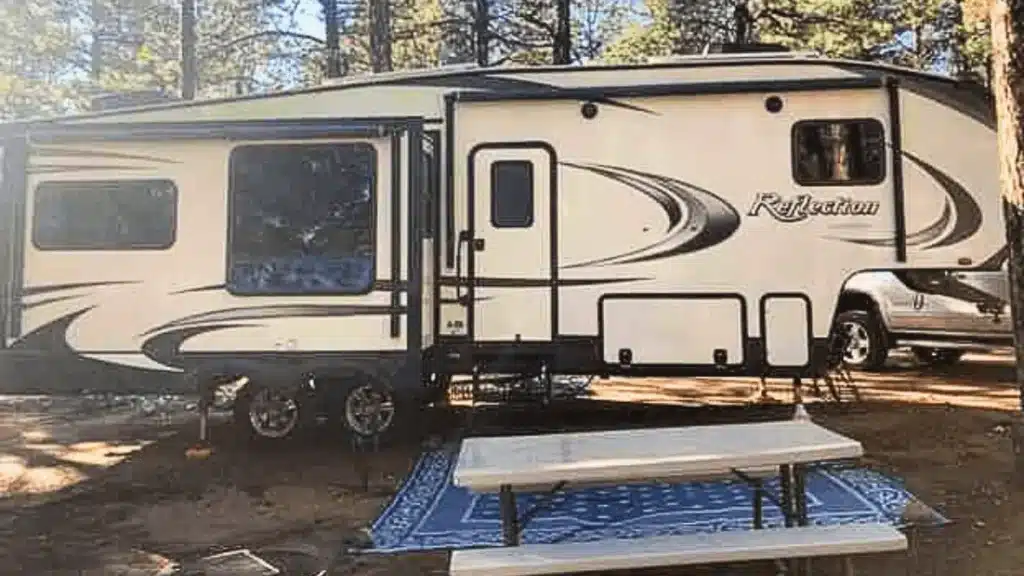
#3: What is the Condition of the RV?
There’s no substitute for viewing an RV with your own eyes to understand its condition. When I was shopping, I called a dealer about one RV that looked fine in pictures. The dealer assured me the coach was in “great” condition, so I drove an hour out of my way in rush hour traffic to see it.
The thing was a mess—furniture torn to shreds, peeling wallpaper, the works. If I’d been more specific in my questioning, I like to think they would have answered me honestly.
Check Everything and Be Thorough
So get specific. Ask about the condition of the tires, brakes, engine (if you’re shopping for motorhomes), and electrical systems. Ask about the roof, plumbing, propane, and—most important of all—any water damage.
Ask for Pictures or Hire a Professional
If you can’t inspect the RV yourself, ask for close-up images of these and other systems. Get as many pictures as you possibly can. It’s not uncommon to hire an inspector to check out an RV for you in another state before you commit to purchasing and picking it up.
But, before you go to all that trouble make sure you know what you’re in for. Pictures can help you verify whether the answers you’re getting are truthful. You may decide that cosmetic damage like torn furniture and wallpaper aren’t a big deal to you if the price is right—but make sure you’re aware of those issues going in.
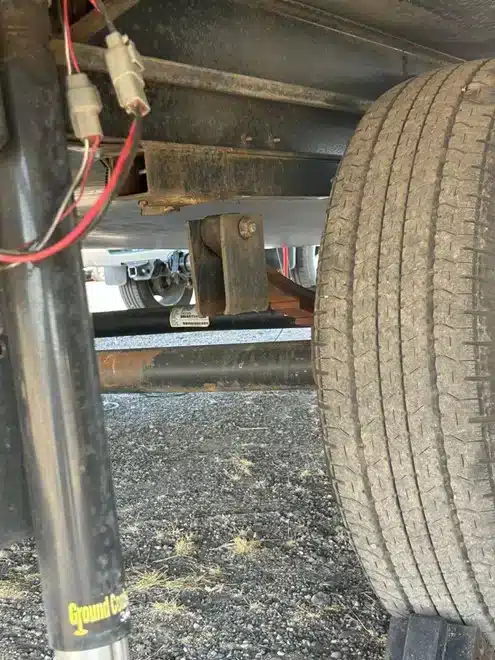
#4: Is There Any Water Damage?
This one bears repeating, and it’s where inspecting an RV yourself (or hiring a professional to do it for you) is worth its weight in gold.
Do Not Ignore Possible Water Damage Issues
Water damage is like the kiss of death to an RV. It can cause rot that will literally make your RV fall apart around you, so keep both eyes and ears open for any signs of past water damage. Feel the floor, walls, and roof for any soft spots, and look for telltale water marks on the wallpaper or flooring.
Open cabinets, get up on the roof, and look under the bed. Check every place you can possibly inspect with your eyeballs, and ask questions about any suspicious areas.
Check the underbelly for rust, and generally look for obvious wear and tear.
#5: Can I Take it Out for a Test?
When You Test, Test Everything
Test everything you can. Pretend you live in the RV for the day, and go about your business using everything. Ask to put some water in the fresh tank to check for leaks and use the water pump. Make sure the water heater and refrigerator are working.
Pull the slides in and out. Put out the awning. Watch some TV. If a feature exists in the RV, use it!
You’ll also want to inspect the furniture, flooring, and cabinets closely for any damage. Open and close all the doors. Worn spots on flooring could indicate slideout issues, and broken appliances could indicate electrical problems. Test all the outlets.
#6: What are the Operating Costs?
If you’re buying from a private owner, they’ll likely know what you can expect to pay. Anyone who’s driven their motorhome across the country will know the average costs to fuel up and how often you need maintenance tasks such as an oil change.
Chassis
Each chassis will have its own maintenance schedule and costs. So ask the owner to fill you in—and then bolster their answer with your own research. For example, a van on a Mercedes Sprinter chassis will cost more to service than a Dodge ProMaster. Make sure you understand the difference so you can make an informed purchase decision.
Trailers and Fifth Wheels
For trailers and fifth wheels, maintenance costs will include packing the wheel bearings, servicing onboard generators, annual cleaning of the AC/fridge/furnace, etc.
High Mileage RVs
Mileage is a factor here, too. High-mileage RVs are likely to cost more to maintain, while low-mileage RVs should cost less. Some might even still be under warranty with the manufacturer.
#7: Are There Any Extended Warranty or Service Plans?
As much as I hated working with my dealer to get service under warranty, it’s worth asking about this option, especially if you’re short on emergency funds.
The hard truth is that, no matter how great a used RV is, stuff will break. It’s only a matter of time. If big things breaking would spell catastrophe for you, it could be worth investing in an extended warranty or service plan to protect your wallet if the worst happens.
Are You Ready to Buy a Used RV?
All in all, buying used can be a great way to get more for less. But don’t fall so head over heels for the rig of your dreams that you skimp on the steps above. If you do, you’re taking a big risk on a major purchase and risking some serious on-the-road heartache in the process.
If you ask the right questions and do your due diligence, buying a used RV can be one of the best ways to get a nicer rig than you could afford to buy brand-new. Take your time, don’t let yourself be rushed, and make an informed buying decision.
After that, enjoy the adventure!
Related Reading
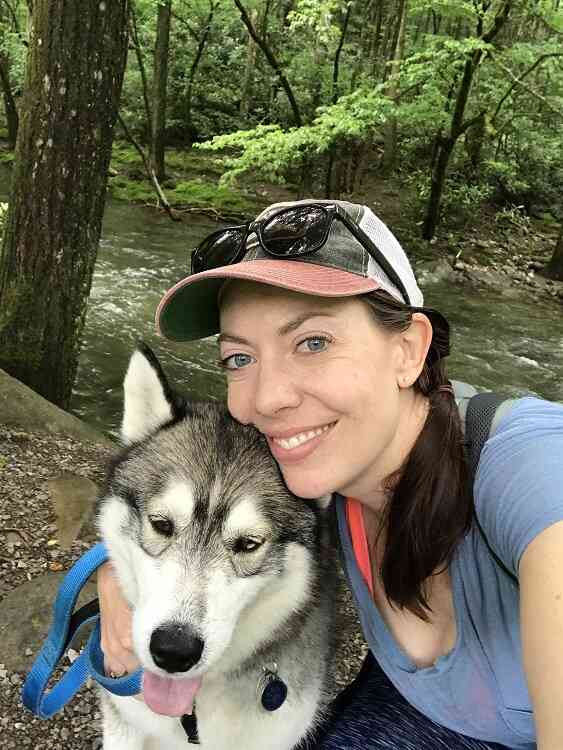
Sarah Kuiken has been a full-time solo traveler for 4 years and counting, but she’s been a solo adventurer for decades. She owns her own copywriting business, Flourish Writing, which she operates from the road. Sarah loves to explore state and national parks with her two dogs, Orion and Piper—wherever they’re allowed, of course. When she’s not whipping up web copy for fellow entrepreneurs, she’s probably out hiking or paddle boarding with the dogs in tow. Learn more about her freelance writing business at FlourishWriting.com.


